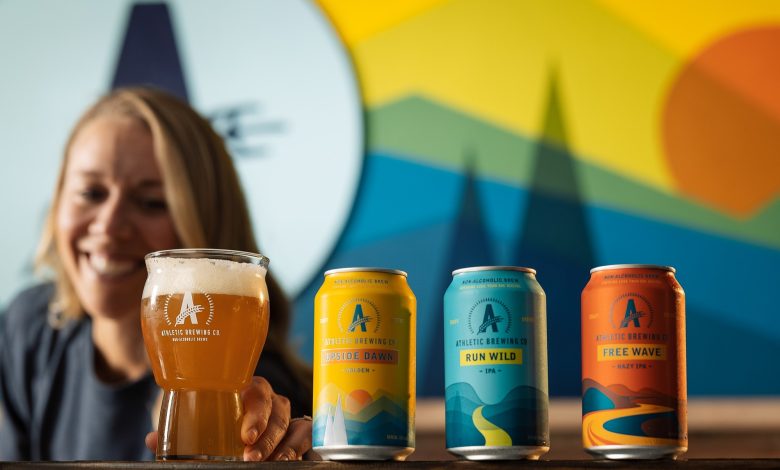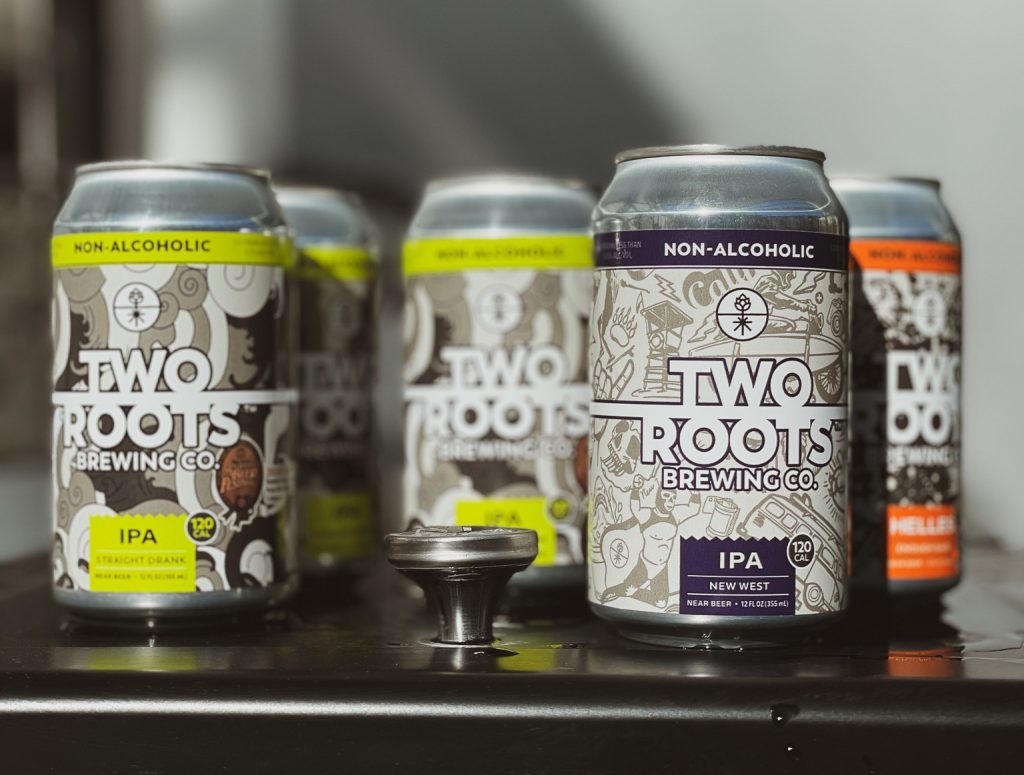
There’s long been a stigma attached to non-alcoholic beer. Most products in the category are bland takes on German-style lagers, which are veritably indistinguishable from one another.
The stagnant category has never seen much innovation, but a crop of new-school non-alcoholic breweries are changing the game by applying a craft-beer approach. And the two most award-winning of those revolutionary operations — Athletic Brewing and Two Roots Brewing — are right here in San Diego.
Bi-coastal Athleticism
Athletic Brewing was founded in 2017 in Stratford, Conn., as the brainchild of Bill Shufelt, who hadn’t initially intended on leading the non-alcoholic beer uprising. All he’d originally wanted was a decent non-alcoholic ale or lager option.
“When I was working in finance, I had an incredibly demanding schedule, and it became clear that alcohol wasn’t compatible with my goals and what I wanted to achieve professionally or personally,” says Shufelt. “All of the non-alcoholic beverage choices were the stuff you’d find on the kids’ menu, and none of the non-alcoholic beers offered the true craft-beer flavor profile that I loved. Athletic emerged from an authentic need in my life. I wanted great non-alcoholic beer but couldn’t find any on the market.”
After teaming up with co-founder and head brewer John Walker — who accepted Shufelt’s proposition to go into business after more than 200 other brewing professionals turned him down — the pair spent years conducting research and homebrewing prototypes. This, despite the fact friends, family and market data were telling them there was zero demand for non-alcoholic beer. The duo contended that there was no demand for the non-alcoholic beer that was available, believing their eventual products — ales and lagers of American, English and German origin, ranging from light to dark, malty to hoppy — would rejuvenate the segment.
They were correct. When opening Athletic’s Stratford brewery and taproom, Shufelt and Walker thought it would take at least five years to outgrow their capacity, but they did it in under a year. By year two, they were at the point where they desperately needed to expand to meet product demand. When determining where to establish their second manufacturing facility, they decided to do so in an area where the majority of their customers were located: the West Coast.
In March 2020, Athletic purchased an 80,000-square-foot building on Trade Street in Miramar. Formerly a pilot-brewery, barrel and packaging warehouse for Ballast Point Brewing, it was well suited for the company, allowing it to hit the ground running. Today, that facility is capable of producing as much as 150,000 barrels of beer annually — as much as the Stratford brewery and a second Connecticut brewery, which is currently under construction. It is also home to more than 60 employees, including brewers who previously worked for San Diego craft-beer companies.
In 2021, Athletic released over 50 different beers, including flagships Run Wild IPA, Upside Dawn Golden Ale, Free Wave Hazy IPA and All Out Stout, plus seasonals such as its Cerveza Athletic Mexican-style lager, canned small-batch offerings and non-alcoholic seltzers. It’s a far cry from the one-size-fits-all archetype established by longtime non-alcoholic beer segment leaders, and it continues to work well for the bi-coastal brewing company.
Athletic currently holds a 45 percent share in the craft non-alcoholic beer category and roughly 8 percent share of the overall U.S. non-alcoholic beer category. They also distribute their products in Canada, Australia, Spain, France, Ireland and the United Kingdom, and intend to launch Japan and Brazil while expanding European distribution to additional countries in the near future.
“We have been the fastest-growing brewery in the country for two years in a row now. In 2020, we were among the top 50 craft breweries in the country and this year we are expected to be in the top 25,” says Shufelt. “We set out to revolutionize beer for the active, modern adult, and we’d like to think we are off to a really good start.”
A THC-rooted route
While the impetus behind Two Roots Brewing was similar to that of Athletic — a desire for quality craft beer sans the unwanted side effects of alcohol consumption — the road the company took to make its mark in the non-alcoholic segment was different. Two Roots was originally established to produce cannabis-infused beers and sold its first THC-infused non-alcoholic beers into Nevada dispensaries in 2018. That process involved brewing and de-alcoholizing beer at the Kearny Mesa brewery Two Roots purchased from the defunct operation of Helm’s Brewing, then shipping the beer to a facility in Las Vegas where it would be infused with THC.
“To conduct product demos for shoppers and dispensary staff, we canned our uninfused product, our non-alcoholic craft beer, and the feedback we received again and again was nothing short of amazing,” says Two Roots chief marketing and revenue officer Maikel de Mortel. “In 2019, we decided to test our beer against the best of the best, entering our core styles into the Great American Beer Festival, where our Enough Said Helles took gold.”
The Great American Beer Festival is the world’s largest and most prestigious annual brewing competition. The rise of non-alcoholic beer has been so rapid that in 2021, the festival added a Non-Alcoholic Beer category, where Two Roots’ Enough Said again struck gold, and a pair of Athletic beers took silver and bronze for a San Diego sweep. Combined, the two companies have amassed well over 50 beer and brewing awards in the past four years, with Athletic tallying more than 40 on its own.
Critical and public acclaim for Two Roots’ non-THC products became such that, in late 2020, the organization shifted its focus to non-alcoholic beers, separating from the cannabis endeavors of its Sorrento Valley-based parent company, Lighthouse Strategies. Two Roots currently employees 16, including brewmaster Kevin Barnes (formerly of Green Flash Brewing).
“We realized that consumer mindsets were quickly shifting from alcohol-consumption towards moderation and mindful consumption,” says de Mortel. “For years, we’ve followed this trend closely across the functional-beverage and food categories. Body- and mind-wellness continue to drive consumer purchase behaviors.”
Since making the switch to non-alcoholic beer production, Two Roots has experienced significant growth. Its beers are now available in 28 states and seven international countries, and revenue is expected to increase five times over this year. In 2022, the company will also expand its portfolio to include a pair of specialty beers as well as limited-time offerings, which will be available via the company’s website.

Safeguarding the segment
Last month marked the launch of the Adult Non-alcoholic Beverage Association, or ANBA, an industry group founded by a coalition of more than 30 brands, including Athletic, to overcome challenges within the fledgling segment, including the absence of universal regulations, industry standards, and guidelines for international trade and market expansion.
According to Global Market Insights, the global market for non-alcoholic adult beverages is expected to grow to $30 billion by 2025. The ANBA hopes to position the segment for success by educating and engaging stakeholders to further accelerate industry growth, creating industry and regulatory compliance standards, providing advocacy and developing government-affairs strategies to protect non-alcoholic beverage producers.
“Non-alcoholic beer is the first significant segment that has grown the category in over a decade. We are opening beer-drinking occasions up from very specific days and times of the day on Friday and Saturday to any day and any occasion in just about any venue,” says de Mortel. “You can now have your favorite beer any night, including Sunday through Thursday, and feel great about it.”
Non-alcoholic beers have been available for decades, but the key to the newfound interest in the segment has to do with a greater variety of styles and better-tasting ales and lagers. The primary challenge that remains for producers is to convince consumers to abandon their long-held impressions of non-alcoholic beer and sample modern-day offerings.
“It’s time to take (non-alcoholic) beer out of the penalty box,” says Shufelt. “Forget what you know about (non-alcoholic) beer in the past and treat yourself to a high-quality product that tastes great and makes you feel even better.”
This article originally appeared in the Business section of the Saturday, January 1, 2022 edition of The San Diego Union-Tribune

